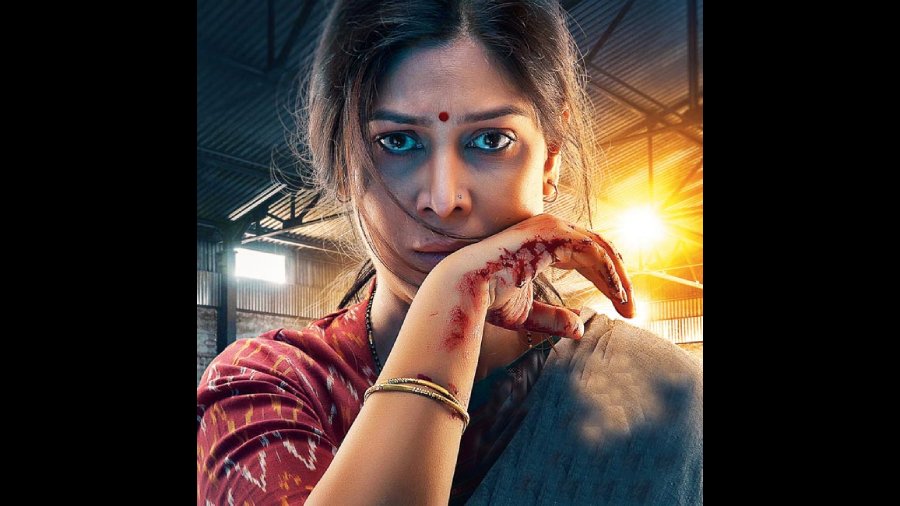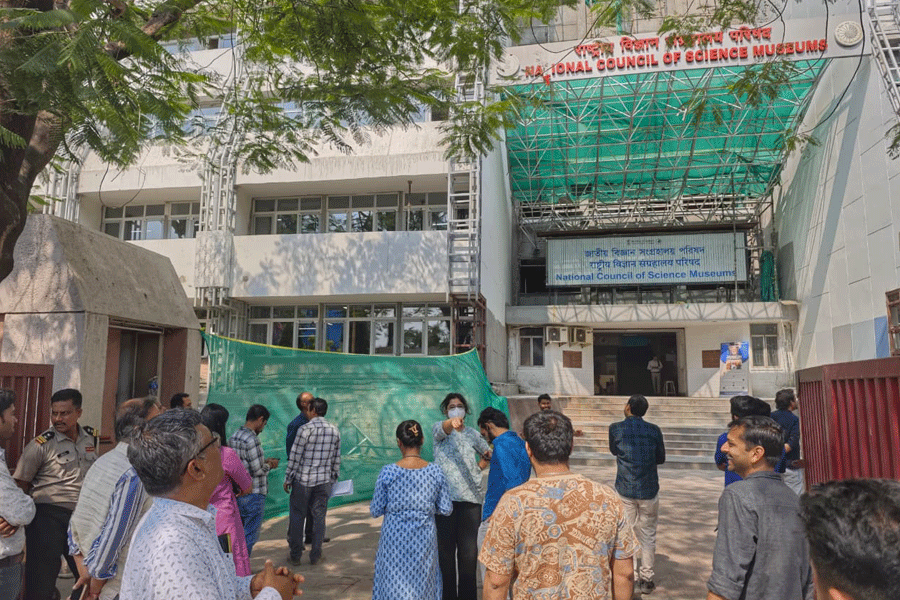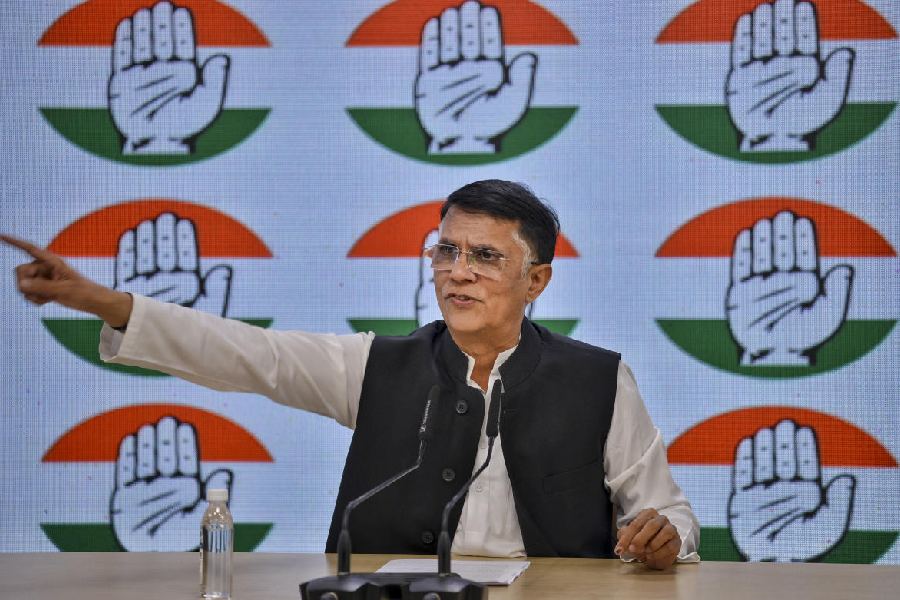A grieving mother’s relentless pursuit to bring the killers of her daughter to book translates into Mai. The series, set to stream on Netflix this Friday, has Sakshi Tanwar leading a cast comprising Raima Sen, Vivek Mushran, Wamiqa Gabbi, Anant Vidhaat, Ankur Ratan, Prashant Narayanan, Vaibhav Raj Gupta and Seema Pahwa.
Produced by Clean Slate Filmz, Mai has been created by Atul Mongia and directed by him along with Anshai Lal. Over a Zoom call, The Telegraph chatted with Atul, Anshai and Tanya Bami, series head, Netflix India, to know more about Mai.
Atul, what was the genesis of Mai?
Atul Mongia: It happened in 2015. I was a late audience to the show-watching phenomenon. When I started watching shows like Breaking Bad and The Wire, I was amazed by the kind of content that could be put out in this format. It remained in my head that maybe one day I would like to do something like this.
So I took a break from writing the film I was working on, but I wanted to continue the discipline of writing. I had this idea of a mother from Uttar Pradesh — my mother is from UP — and I just started toying with it.
It almost started like an auto-writing process, and somehow in 10 days, a world came out of it, characters came about and my bible (a reference document used by screenwriters for information on characters, settings, and other elements of a TV or film project) got ready. We didn’t even know what bibles were at that time (smiles). I actually downloaded 15 bibles of the shows that I like, and they are all available online. I realised that all of them are structured differently, and I made the structure of my Mai bible. It was quite fluid... in just 10 days, I built a world of 27 characters.
Cut to 2018 where Karnesh Ssharma (the head honcho of Clean Slate Filmz) was looking to do something in the world of television series. He and I had been discussing about making a film for sometime and he asked me if I had a show because Netflix had approached him for it. And then I suddenly remembered ki teen saal pehle kuch likha tha (laughs). I pitched it and it was a very smooth and fast process of getting greenlit.
Having watched quite a bit of Mai, I can safely say that it is a thriller that meshes many genres. How would you comment on the universality of the subject given that ‘mother’ is a universal emotion?
Atul: Ya, it’s very universal. The most beautiful relationship is between a mother and a child. Parenting is also a one-way street... we all take our parents for granted. Every person — whether they are a child or a parent — understands this filial emotion. Even those who have had strained relationships with their parents understand this emotion, albeit in a different context. So this is as universal as a love story. Love is universal, and so is motherhood.
In Mai, we have contextualised this emotion very specifically to our milieu. Mai is almost about taking the stereotype of the nice bahu, the good wife, the gentle mother, the sacrificing mother and flipping it on its head, and placing her (Sheel, played by Sakshi Tanwar) in a Machiavellian world.
Anshai Lal: I think what’s interesting is how the writing team has kept the universal theme and yet made it unique. A mother’s reaction to a world that she’s pushed in unknowingly and has to fight through it is what makes this show unique.
Tanya Bami: Each character in Mai is just so distinct. Sheel is rising above her circumstances as an individual and also above the family dynamic that she has lived in and fulfilled all these years silently. And suddenly, this incident takes place which literally pulls the carpet out from under her feet. That upturns the conventional, patriarchal dynamic that she’s been a part of. I think Prashant Narayanan is a power-packed actor, so is Vivek Mushran who brings in so much nuance. Wamiqa (Gabbi) plays a deaf girl but she’s so spunky and full of beans despite her perceived disability. I think the characters stay with you and so does the story. It’s really about the passion with which it has been created and written.
Tanya, Netflix has always stressed on the importance of diversity of content and how you always want to tell global stories with an intimate core. How does Mai fit in?
Tanya: I think Mai is a signature series for us. We are really excited about how it’s all come together, from the writing to the detail to the love and the passion. The way it’s been made harks back to some of Netflix’s legacy titles like, say, Delhi Crime. We are very bullish about this title.
Mai, at the heart of it, is a fairly heavy subject. Grief, and the way with which it has been dealt... the sensitivity and then the thrill that keeps the show going.... Clean Slate (Filmz) has a trademark style in which they put together their stories, whether it was NH10 or Bulbbul or even Chakda Express that they are doing with us. Their content style is something that syncs completely with our sensibilities and with what our audience enjoy.
Atul, what’s been the most creatively satisfying aspect of seeing such a passion project come together?
Atul: The fact that it was just an idea in my head, then made it to paper, and then one person believed in it. The project got going and then 10 people joined it and then a few hundred people joined in. That’s very humbling. The fact that you have an idea and then so many people come together to give their everything to it. It’s magical to see things come together.
Is it also scary?
Anshai: Of course it is! Film-making is never easy, you get the pangs and the nerves all the time. But that’s the high we all work for, right?
Sakshi Tanwar has been the seminal bahu from the era of Ekta Kapoor-produced soaps. Was signing her on a case of inspired casting since Mai’s core is essentially about overturning the stereotype of the familiar Indian middle-class mother?
Atul: Honestly, she wasn’t the first choice. We were thinking of several names, of which Sakshi was one. We did a mock shoot with her that convinced everybody that she was the one. We picked two very tough scenes for her — I know it’s unfair — but she did them so well that after she left, I was jumping around because I knew I had found my Sheel.
Anshai: You are right when you say that she was the quintessential TV bahu for years. One of the scenes she did in the mock shoot was a very dark scene and she just turned it on its head.
Atul: I think her casting helps the show because we are trying to take a stereotypical character and break the mould.
Tanya: The OTT audiences enjoy that. The surprise value of seeing her doing the things she does in the trailer has been tremendous... the reactions and comments have really displayed how excited people are to see her in a role like this. It’s a no-holds-barred performance. Casting her allows us to also talk to her fanbase which, is wide and diverse. That happened to us with the Kapil Sharma special that we did recently.
The mother as the dispenser of justice, sometimes even the vigilante, and in the case of Mai, also the detective, is a popular sub-genre across the world. Any favourites?
Tanya: Instead of just the mother, I think I would like to look at parents who are seeking revenge or are fighting for justice for their children. For me, Taken is a big favourite. Also, a lofty reference would be Breaking Bad... a normal middle-class man who has to rise above his circumstances and plunge into a dark, dark world.











